142 books about Lesbian Studies and 6
start with U
142 books about Lesbian Studies and 6
142 books about Lesbian Studies
6 start with U start with U
6 start with U start with U
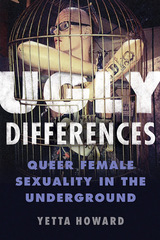
Ugly Differences
Queer Female Sexuality in the Underground
Yetta Howard
University of Illinois Press, 2018
What would it mean to turn to ugliness rather than turn away from it? Indeed, the idea of ugly often becomes synonymous with non-white, non-male, and non-heterosexual physicality and experience. That same pejorative migrates to become a label for practices within underground culture. In Ugly Differences, Yetta Howard uses underground contexts to theorize queer difference by locating ugliness at the intersection of the physical, experiential, and textual. From that nexus, Howard contends that ugliness—as a mode of pejorative identification—is fundamental to the cultural formations of queer female sexuality. Slava Tsukerman's postpunk film Liquid Sky, Sapphire's poetry, Roberta Gregory's Bitchy Butch comix, New Queer Cinema such as High Art—these and other non-canonical works contribute to an audacious critique. Howard reveals how the things we see, read as, or experience as ugly productively account for non-dominant sexual identities and creative practices. Ugly Differences offers eye-opening ways to approach queerness and its myriad underground representations.
[more]
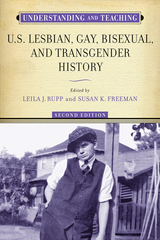
Understanding and Teaching U.S. Lesbian, Gay, Bisexual, and Transgender History
Edited by Leila J. Rupp and Susan K. Freeman
University of Wisconsin Press, 2017
Taking into account recent historic changes, this second edition updates the essays on the Supreme Court, same-sex marriage, the Right, and trans history. Authors of several other essays have taken the opportunity to add new material and references where warranted.
[more]
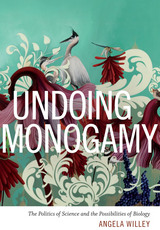
Undoing Monogamy
The Politics of Science and the Possibilities of Biology
Angela Willey
Duke University Press, 2016
In Undoing Monogamy Angela Willey offers a radically interdisciplinary exploration of the concept of monogamy in U.S. science and culture, propelled by queer feminist desires for new modes of conceptualization and new forms of belonging. She approaches the politics and materiality of monogamy as intertwined with one another such that disciplinary ways of knowing themselves become an object of critical inquiry. Refusing to answer the naturalization of monogamy with a naturalization of nonmonogamy, Willey demands a critical reorientation toward the monogamy question in the natural sciences, social sciences, and humanities. The book examines colonial sexual science, monogamous voles, polyamory, and the work of Alison Bechdel and Audre Lorde to show how challenging the lens through which human nature is seen as monogamous or nonmonogamous forces us to reconsider our investments in coupling and in disciplinary notions of biological bodies.
[more]
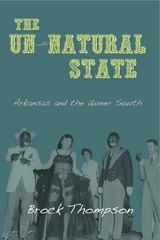
The Un-Natural State
Arkansas and the Queer South
Brock Thompson
University of Arkansas Press, 2010
The Un-Natural State is a one-of-a-kind study of gay and lesbian life in Arkansas in the twentieth century, a deft weaving together of Arkansas history, dozens of oral histories, and Brock Thompson's own story. Thompson analyzes the meaning of rural drag shows, including a compelling description of a 1930s seasonal beauty pageant in Wilson, Arkansas, where white men in drag shared the stage with other white men in blackface, a suggestive mingling that went to the core of both racial transgression and sexual disobedience. These small town entertainments put on in churches and schools emerged decades later in gay bars across the state as a lucrative business practice and a larger means of community expression, while in the same period the state's sodomy law was rewritten to condemn sexual acts between those of the same sex in language similar to what was once used to denounce interracial sex. Thompson goes on to describe several lesbian communities established in the Ozark Mountains during the sixties and seventies and offers a substantial account of Eureka Springs's informal status as the "gay capital of the Ozarks." Through this exploration of identity formation, group articulation, political mobilization, and cultural visibility within the context of historical episodes such as the Second World War, the civil rights movement, and the AIDS epidemic, The Un-Natural State contributes not only to our understanding of gay and lesbian history but also to our understanding of the South.
[more]
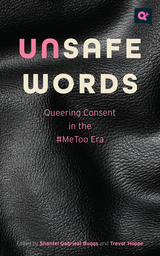
Unsafe Words
Queering Consent in the #MeToo Era
Shantel Gabrieal Buggs
Rutgers University Press, 2023
Queer people may not have invented sex, but queers have long been pioneers in imagining new ways to have it. Yet their voices have been largely absent from the #MeToo conversation. What can queer people learn from the #MeToo conversation? And what can queer communities teach the rest of the world about ethical sex? This provocative book brings together academics, activists, artists, and sex workers to tackle challenging questions about sex, power, consent, and harm. While responding to the need for sex to be consensual and mutually pleasurable, these chapter authors resist the heteronormative assumptions, class norms, and racial privilege underlying much #MeToo discourse. The essays reveal the tools that queer communities themselves have developed to practice ethical sex—from the sex worker negotiating with her client to the gay man having anonymous sex in the back room. At the same time, they explore how queer communities might better prevent and respond to sexual violence without recourse to a police force that is frequently racist, homophobic, and transphobic.
Telling a queerer side of the #MeToo story, Unsafe Words dares to challenge dogmatic assumptions about sex and consent while developing tools and language to promote more ethical and more pleasurable sex for everyone.
Telling a queerer side of the #MeToo story, Unsafe Words dares to challenge dogmatic assumptions about sex and consent while developing tools and language to promote more ethical and more pleasurable sex for everyone.
[more]
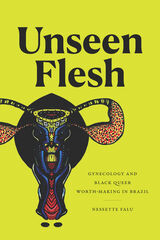
Unseen Flesh
Gynecology and Black Queer Worth-Making in Brazil
Nessette Falu
Duke University Press, 2023
In Unseen Flesh Nessette Falu explores how Black lesbians in Brazil define and sustain their well-being and self-worth against persistent racial, sexual, class, and gender-based prejudice. Focusing on the trauma caused by interactions with gynecologists, Falu draws on in-depth ethnographic work among the Black lesbian community to reveal their profoundly negative affective experiences within Brazil’s deeply biased medical system. In the face of such entrenched, intersectional intimate violence, Falu’s informants actively pursue well-being in ways that channel their struggle for self-worth toward broader goals of social change, self care, and communal action. Demonstrating how the racist and heteronormative underpinnings of gynecology erase Black lesbian subjecthood through mental, emotional, and physical traumas, Falu explores the daily resistance and abolitionist practices of worth-making that claim and sustain Black queer identity and living. Falu rethinks the medicalization of race, sex, and gender in Brazil and elsewhere while offering a new perspective on Black queer life through well-being grounded in relationships, socioeconomic struggles, the erotic, and freedom strivings.
[more]
READERS
Browse our collection.
PUBLISHERS
See BiblioVault's publisher services.
STUDENT SERVICES
Files for college accessibility offices.
UChicago Accessibility Resources
home | accessibility | search | about | contact us
BiblioVault ® 2001 - 2024
The University of Chicago Press









